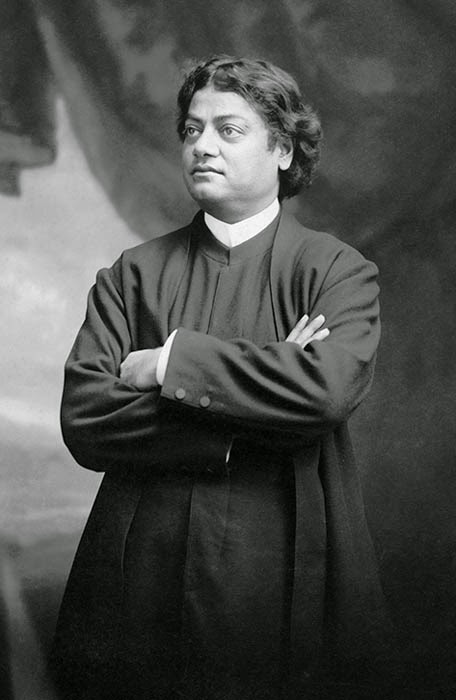STEPS OF HINDU PHILOSOPHIC THOUGHT : 5.
So far we see that man is a being, who has first a gross body which dissolves very quickly, then a fine body which remains through aeons, and then a Jiva. This Jiva, according to the Vedanta philosophy, is eternal, just as God is eternal. Nature is also eternal, but changefully eternal. The material of nature — Prana and Akasha — is eternal, but it is changing into different forms eternally. But the Jiva is not manufactured either of Akasha or Prana; it is immaterial and, therefore, will remain for ever. It is not the result of any combination of Prana and Akasha, and whatever is not the result of combination, will never be destroyed, because destruction is going back to causes. The gross body is a compound of Akasha and Prana and, therefore, will be decomposed. The fine body will also be decomposed, after a long time, but the Jiva is simple, and will never be destroyed. It was never born for the same reason. Nothing simple can be born.
The same argument applies. That which is a compound only can be born. The whole of nature comprising millions and millions of souls is under the will of God. God is all-pervading, omniscient, formless, and He is working through nature day and night. The whole of it is under His control. He is the eternal Ruler. So say the dualists. Then the question comes: If God is the ruler of this universe, why did He create such a wicked universe, why must we suffer so much? They say, it is not God's fault. It is our fault that we suffer. Whatever we sow we reap. He did not do anything to punish us. Man is born poor, or blind, or some other way. What is the reason? He had done something before, he was born that way. The Jiva has been existing for all time, was never created. It has been doing all sorts of things all the time. Whatever we do reacts upon us. If we do good, we shall have happiness, and if evil, unhappiness. So the Jiva goes on enjoying and suffering, and doing all sorts of things.
What comes after death? All these Vedanta philosophers admit that this Jiva is by its own nature pure. But ignorance covers its real nature, they say. As by evil deeds it has covered itself with ignorance, so by good deeds it becomes conscious of its own nature again. Just as it is eternal, so its nature is pure. The nature of every being is pure.
When through good deeds all its sins and misdeeds have been washed away, then the Jiva becomes pure again, and when it becomes pure, it goes to what is called Devayâna. Its organ of speech enters the mind. You cannot think without words. Wherever there is thought, there must be words. As words enter the mind, so the mind is resolved into the Prana, and the Prana into the Jiva. Then the Jiva gets quickly out of the body, and goes to the solar regions. This universe has sphere after sphere. This earth is the world sphere, in which are moons, suns, and stars. Beyond that here is the solar sphere, and beyond that another which they call the lunar sphere. Beyond that there is the sphere which they call the sphere of lightning, the electric sphere, and when the Jiva goes there, there comes another Jiva, already perfect, to receive it, and takes it to another world, the highest heaven, called the Brahmaloka, where the Jiva lives eternally, no more to be born or to die. It enjoys through eternity, and gets all sorts of powers, except the power of creation.
There is only one ruler of the universe, and that is God. No one can become God; the dualists maintain that if you say you are God, it is a blasphemy. All powers except the creative come to the Jiva, and if it likes to have bodies, and work in different parts of the world, it can do so. If it orders all the gods to come before it, if it wants its forefathers to come, they all appear at its command. Such are its powers that it never feels any more pain, and if it wants, it can live in the Brahmaloka through all eternity. This is the highest man, who has attained the love of God, who has become perfectly unselfish, perfectly purified, who has given up all desires, and who does not want to do anything except worship and love God.
To be continued ...





Comments
Post a Comment